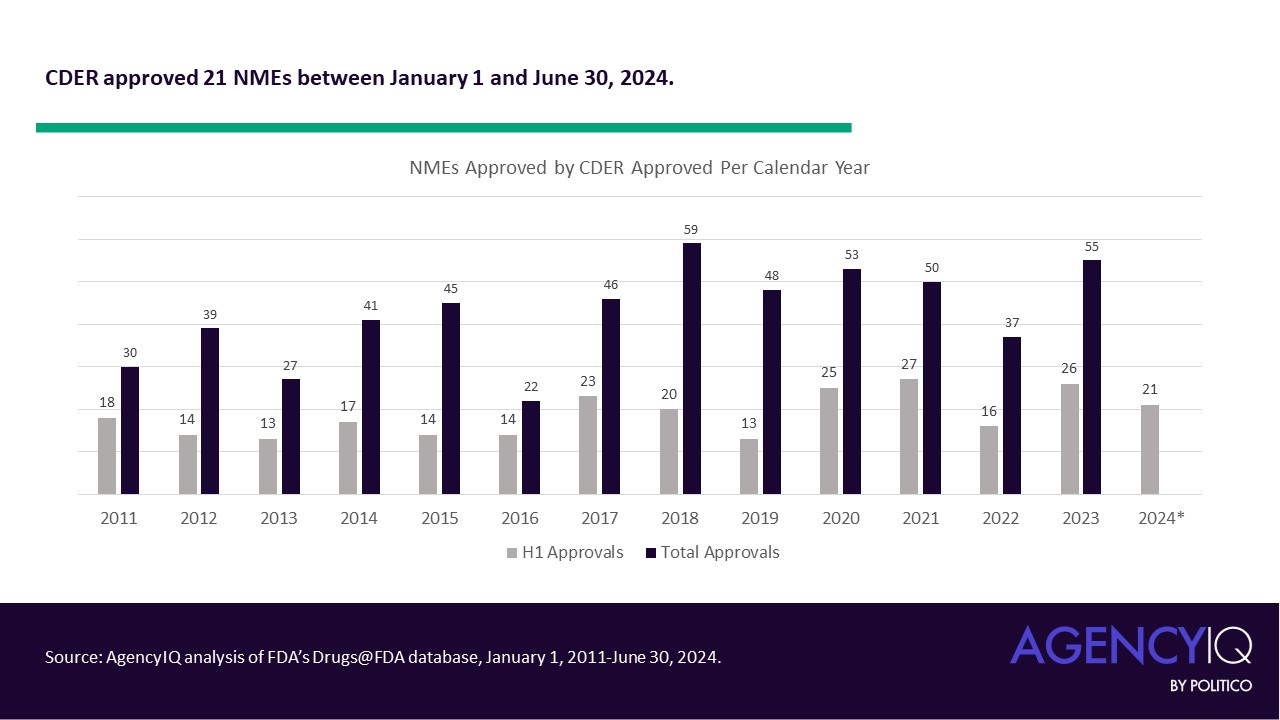In the first half of 2024, the FDA’s Center for Drug Evaluation and Research (CDER) approved 21 novel drug products, revealing trends in the reliance on single pivotal trials and the racial/ethnic diversity of trial participants. This analysis by AgencyIQ offers a midpoint overview of drug approval processes and characteristics, including drugs’ indications, mechanisms, and the clinical trial design.
### Novel Drug Approvals in 2024
The 21 approved New Molecular Entities (NMEs) cover a range of medical conditions from chronic diseases like COPD to rare conditions like WHIM syndrome. Notable approvals include ‘Ohtuvayre’ for COPD, ‘Piasky’ for paroxysmal nocturnal hemoglobinuria, and ‘Imdelltra’ for extensive stage small cell lung cancer. Each drug addresses significant unmet medical needs, providing new treatment options for patients with these conditions.
### Clinical Trial Trends
A major trend highlighted by the approvals is the reliance on single pivotal trials. Over 70% of the NMEs approved in the first half of 2024 were supported by just one pivotal trial, a significant shift from earlier practices where multiple trials were standard. This trend has been rising since 2020, signaling the FDA’s flexibility and responsiveness to the need for expedited drug approval processes for serious conditions.
### Race and Ethnicity in Clinical Trials
Despite ongoing global conversations about diversity in clinical trials, considerable gaps remain. Many drugs were approved with trials that had an overwhelming majority of White participants, casting doubts on the extrapolation of the data across more diverse populations. This is evidenced by some key drugs like ‘Ohtuvayre’ and ‘Xolremdi’, which had over 90% White participants in their trials. This highlights an ongoing challenge in engaging diverse populations in clinical research, impacting the generalizability and applicability of trial results.
### Regulatory and Policy Implications
In response to the lack of diversity, the FDA has been mandated by the Consolidated Appropriations Act of 2023 to require Diversity Action Plans (DAPs) for certain clinical studies. A draft guidance released in June 2024 sets out how companies should design these plans, aiming at improving diversity in clinical trial enrollment actively. However, the full impact of these guidelines will likely not be seen until they are fully implemented, projected around late 2025.
### Conclusion
The first half of 2024 demonstrates a continued adaptation by the FDA towards more streamlined drug approvals, particularly by allowing approvals based on single pivotal trials. While this can accelerate access to critical new therapies, the ongoing issues with trial diversity signal a need for more substantive regulatory and industry-wide shifts towards inclusive research practices. The FDA’s new requirements for Diversity Action Plans indicate a step in the right direction, but the real-world impact of these policies will require careful monitoring and continued advocacy for inclusivity in clinical research.
#Analysis #Life #Sciences #Halfway #drug #approvals #supportive #clinical #trials



